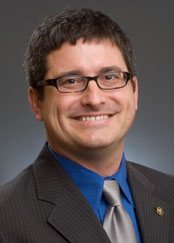Matthew Liao-Troth and Dr. Wendy Hawke Lenz
Listen to a recording of the show.
Matthew Liao-Troth
Matthew Liao-Troth is the fourth Dean of the J. Whitney Bunting College of Business at Georgia College & State University. In this role he leads the college in its mission to "foster the development of capable business professionals who are responsible citizens grounded in a liberal arts education." The college has approximately 1200 undergraduate students and more than 200 graduate students in a variety of business specialties. It was the second school in the University System of Georgia to offer the MBA, and the first to offer the Master of Management Information Systems. Since his arrival the undergraduate business programs have climbed in the US News rankings 30 positions to tie with prominent private peer universities such as Elon and Stetson, and CEO Magazine has twice ranked the Georgia WebMBA® “Tier 1” among the top 26 in the world. He was recruited into this position from Western Washington University, in Bellingham, WA.
At Western Washington University Professor Liao-Troth served as Management Department Chair, MBA Programs Director and Graduate Programs Director in the College of Business and Economics, and as Faculty Senate President for the university. He was twice awarded the MBA "Professor of the Year" for his teaching the management of organizations and people, negotiation and labor relations, and organizational power and politics. At Western Washington University he also received the "Dean’s Research Award" for his work on the psychological contract of volunteers.
Dean Liao-Troth’s scholarship focuses on the relationship between individuals and organizations; he has authored over three-dozen published articles and edited the book Challenges in Volunteer Management, which is widely used in graduate degree programs. He has also served as the head of his academic association, the Public and Nonprofit Division of the Academy of Management.
Dr. Liao-Troth was on the faculty of DePaul University in Chicago and Washington University in St. Louis before going to Western Washington University. He also taught at the University of Arizona, San Diego State University, the University of Illinois at Chicago, and Loyola University Chicago. Outside of academia, he served as a division executive with the Boy Scouts of America for several years, and has been involved with family businesses for most of his life. He has consulted for a variety of business, nonprofit, and government organizations.
In his personal life, Dr. Liao-Troth is happily married with two daughters. His primary hobby is Italian motor scooters.
Dr. Wendy Hawke Lenz, MD
Board Certified: Internal medicine, hospice, and palliative medicine
Medical Degree: Georgetown University School of Medicine in Washington, DC
Residency: University of North Carolina at Chapel Hill in Chapel Hill, NC
Special Interests: Pain and symptom control when cancer cannot be cured, family dynamics, and emotional well-being
Dr. Lenz is a member of the American Association of Hospice and Palliative Medicine, the American Pain Society, and the Georgia Society of Clinical Oncology. She is also the founder and immediate past president of the Magic of Life Foundation, Inc. She is founder and serves on the medical advisory board of Longleaf Hospice.
Dr. Lenz is co-editor of the American Academy of Hospice and Palliative Medicine’s “Curriculum Guideline for Hospice Care.” She currently serves on the national examination committee of American Board of Hospice and Palliative Medicine, has been named “Who’s Who of Business and Healthcare Professionals,” and is a member of the American College of Physician Executives and the American College of Health Care Executives.
Show notes
MBA and MD stats – 11/27
How many MD/MBA dual degree programs 20yrs ago, 10yrs ago 5, and today?
- In 1997 there were 3 or 4 MD/MBA dual degree programs
- In 2003 there were 33 programs
- Today there are 65 programs
- Source: New York Times and Boston University
How many doctors are currently believed to have an MBA?
- There are an estimated 500 dual degree (MD/MBA) graduates per year
Is there any business training in the regular med school curriculum?
- Research has found that fewer than half of graduating medical students in the U.S. receives adequate training to understand healthcare system strategic approach and the economics of practicing medicine.
- In a recent article in the New England Journal of Medicine two University of Michigan physicians recommended that healthcare policy be added to Medical School Curriculum.
- “’Medical student and resident education has to include instruction on how healthcare systems function — especially with the advent of complicated national healthcare reforms,’ University of Michigan physicians said.”
- “Without education in health policy and the healthcare system, physicians are missing critical tools in their professional toolbox,” said co-author Matthew M. Davis, MD, associate professor at U-M in Pediatrics and Communicable Diseases, Internal Medicine and Public Policy.
- Source: Michelle Mudge-Riley DO on Freelance MD and KevinMD.com
What percent of U.S. physicians practice in a private practice (small business)?
- As recently as 2005, more than two-thirds of medical practices were physician-owned — a share that had been relatively constant for many years, the Medical Group Management Association says. But within three years, that share dropped below 50 percent, and analysts say the slide has continued.
Current average salary in medical residency? Medical fellowship programs?
- The average salary for a first year resident is in the range of $35,000 with increases each year of approximately $1,500.
- Fellowship average salary is roughly $45-50,000 with increases each year.
Current average debt carried by a doctor starting their career?
- It is estimated that over 86% of graduates carry educational debt.
- The median debt burden for graduates of public medical institutions has risen to over $119,000 while that for private school graduates has increased to nearly $150,000.
- 41% of students with educational debt report principle in excess of $150,000 and a significant minority reports debt as high as $350,000.
- Medical education debt is 4.5 times as high as it was in 1984, growing well beyond the consumer price index.
- Source: American Medical Student Association
Current average cost of undergrad degree, med school degree, MBA degree public/private? (Just tuition — doesn’t include cost of living expenses, lab fees, books, etc.)
- Undergrad degree at public school: In 2011-12, public four-year colleges charge, on average, $8,244 in tuition and fees for in-state students. The average surcharge for full-time out-of-state students at these institutions is $12,526.
- Undergrad degree at private school: nonprofit four-year colleges charge, on average, $28,500 per year in tuition and fees.
- Medical degree at public school: the median tuition in 2010-2011 was $28,685 (per year)
- Medical degree at private school: $46,899 (per year)
- MBA: Although the cost of an MBA degree can vary, the average tuition for a two-year MBA program exceeds $60,000. If you attend one of the top business schools in the U.S., you can expect to pay as much as $100,000 or more in tuition and fees. (per year)
- Source: The College Board, Association of American Medical Colleges




